北师大版英语六年级上册复习
北师大版六年级英语上复习Unit1

北师大版六年级英语上复习Unit1Meeting the BINGO Kids语法要点:一般现在时、一般过去时、现在进行时、一般将来时四种时态的复习形容词比较级、最高级的构成及用法一、一般现在时(一)基本用法:1.表示经常的或习惯性的动作,常与表示频率的时间状语连用。
如:always, usually, often, sometimes, hardly ever, never ,once a month, twice a week, three times a day, every morning/afternoon/night/evening/day/week/month/year等。
I leave home for school at 7:00 every morning.2.表示主语具备的性格、能力、特征和状态。
Ann writes good English but does not speak well.3.表示客观事实和普遍真理。
The earth moves around the sun.(二)实意动词一般现在时的基本格式:当主语是第三人称单数时:肯定句主语+动词三单+其他否定句主语+doesn't+动词原形+其他一般疑问句Does+主语+动词原形+其他肯定回答Yes,主语+does否定回答No,主语+doesn't特殊疑问句特殊疑问词+一般疑问句当主语不是第三人称单数时:肯定句主语+动词原形+其他否定句主语+don't+动词原形+其他一般疑问句Do+主语+动词原形+其他(三)谓语动词的变化规则:1.如果主语是名词复数、第三人称复数、第二人称you和第一人称I、we ,谓语动词用动词原型表示:如:Those apples are red.They are our teachers.You usually late.We usually go to school at 7:30.I often get up at 6:30.2.主语是任何一个单数名词、不可数名词或者是第三人称单数,谓语动词要进行变化,规律如下:(1) 在动词后加-s read - reads,write - writes,say - says(2) 以s,x,ch,sh 结尾的词加-es teach - teaches,wash - washes,guess - guesses(3) 以辅音字母+y结尾的词变y为i再加-es try - tries,carry - carries(4) 特殊变化:be - am, is, are have - have, has二、一般过去时(一)概念:一般过去时表示过去某个时间发生的动作或存在的状态,常用的表示过去时间的词语有:yesterday, last week/month/year/time, just now, once upon a time, long long ago,three days ago等。
北师大版英语六年级上册Units1-2重难点知识归纳总结

北师大版英语六年级上册Units1-2Unit 1 Space【重点词汇】1. spaceship 宇宙飞船2. moon 月亮,月球3. astronaut 宇航员4. have/has (had)5. dream 梦6. last night 昨夜7. am/is (was)8. are (were)9. air 空气10. friendly 友好的11. Earth 地球12. yesterday 昨天13. swimming pool 游泳池【重点句型】1. I had a dream last night. 我昨晚做了一个梦。
2. I was in a spaceship. 我在宇宙飞船里。
3. How interesting! 多么有趣啊!4. —Are you ready? 你准备好了吗?—Yes, I am. 是的,我准备好了。
5. We were astronauts. 我们是宇航员。
6. We are on Mars. 我们在火星上。
7. There were no trees. There was no air. There was no water.没有树。
没有空气。
没有水。
8. —Where are you from? 你们来自哪里?—We are from the Earth. 我们来自地球。
9. We had a great time together. 我们在一起玩得很开心。
10. —Where were you yesterday afternoon? 你昨天下午在哪里?—I was at the swimming pool. 我在游泳池。
11. It was sunny but cool. 天气晴朗但很凉爽。
Unit 2 An Accident【重点词汇】1. clean (cleaned) 清洁,打扫2. film 电影3. visit (visited) 拜访,看望4. go (went) 走;去5. slowly 缓慢地6. want (wanted) 要,想要7. pass (passed) 传,递8. eat (ate) 吃9. quickly 迅速地10. another 另一,又一11. suddenly 突然12. look (looked) 看起来,看似13. sick 不适的;生病的14. cough (coughed) 咳嗽15. everywhere 处处,到处16. help (helped) 帮助,帮忙17. careful 小心的【重点句型】1. —What did you do last night? 你昨晚做什么了?—I watched TV. 我看了电视。
北师大版六年级英语上册基础知识梳理(20201226114506)
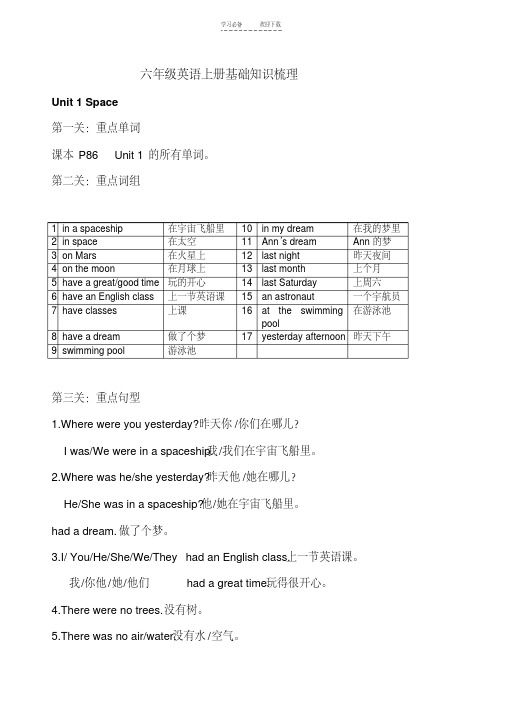
六年级英语上册基础知识梳理Unit 1 Space第一关:重点单词课本P86 Unit 1的所有单词。
第二关:重点词组1 in a spaceship 在宇宙飞船里10 in my dream 在我的梦里2 in space 在太空11 Ann’s dream Ann的梦3 on Mars 在火星上12 last night 昨天夜间4 on the moon 在月球上13 last month 上个月5 have a great/good time 玩的开心14 last Saturday 上周六6 have an English class 上一节英语课15 an astronaut 一个宇航员在游泳池7 have classes 上课16 at the swimmingpool8 have a dream 做了个梦17 yesterday afternoon 昨天下午9 swimming pool 游泳池第三关:重点句型1.Where were you yesterday? 昨天你/你们在哪儿?I was/We were in a spaceship.我/我们在宇宙飞船里。
2.Where was he/she yesterday? 昨天他/她在哪儿?He/She was in a spaceship? 他/她在宇宙飞船里。
had a dream. 做了个梦。
3.I/ You/He/She/We/They had an English class.上一节英语课。
我/你他/她/他们had a great time.玩得很开心。
4.There were no trees. 没有树。
5.There was no air/water.没有水/空气。
6.I had a dream last night.昨晚我做了个梦。
7.Ken was in my dream. Ken在我的梦里。
8.It was cold on Mars. 火星上很冷。
六年级上册英语复习资料期末整理_北师大版(三起)

北师大版六年级英语上期末复习整理一、(一)26个字母(二)三个单元动词过去式集锦原形过去式原形过去式am/ is 是was watch看watched are 是were clean洗cleaned have/has有had visit 拜访visited eat 吃ate want想wanted do做did help帮助helped see看saw wash洗washed go 走went paint绘画painted give给gave jump跳jumped run跑ran decide决定decided come来came play玩played take拿took二、Unit1(一)重要词组1.在宇宙飞船里i..spaceshi.2.一位宇航员a.astronau.3.在月球上on the moon4.在太空里in space5.做梦have a dream6.上英语课have an English class7.玩的愉快have a great time (二)重要句子1.你昨天在哪里...我在宇宙飞船里。
Where were you yesterday? I was in a spaceship.2.他昨天在哪里?他在月球之上。
Where was he yesterday? He was on the moon.3.那儿没有树。
There were no trees.4.那儿没有水。
There was no water.三、Unit2 An Accident(一)重要词组1.看电视watch TV2.看电影watch a film3.打扫房间clean the room4.拜访朋友 visit a friend5.帮助妈妈 help Mom6.游泳 go swimming7.去学校go to school 8.在家 at home(二)重要句子你昨晚在做什么?我在看电视。
What did you do last night? I watched TV.1.我昨天没有去拜访朋友。
北师大版英语六年级上册
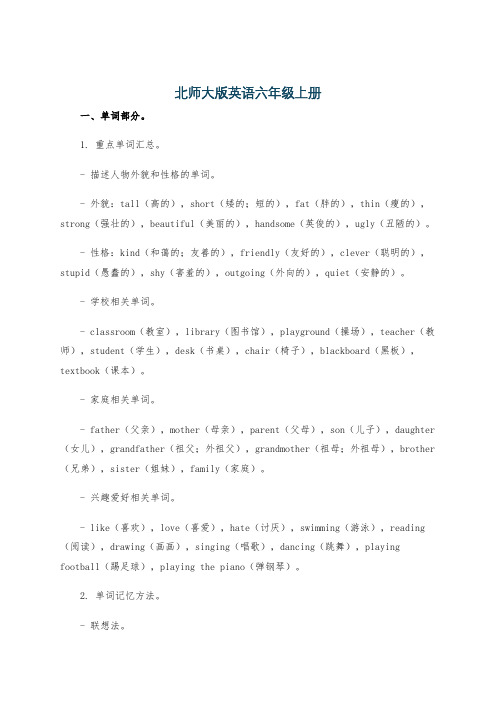
北师大版英语六年级上册一、单词部分。
1. 重点单词汇总。
- 描述人物外貌和性格的单词。
- 外貌:tall(高的),short(矮的;短的),fat(胖的),thin(瘦的),strong(强壮的),beautiful(美丽的),handsome(英俊的),ugly(丑陋的)。
- 性格:kind(和蔼的;友善的),friendly(友好的),clever(聪明的),stupid(愚蠢的),shy(害羞的),outgoing(外向的),quiet(安静的)。
- 学校相关单词。
- classroom(教室),library(图书馆),playground(操场),teacher(教师),student(学生),desk(书桌),chair(椅子),blackboard(黑板),textbook(课本)。
- 家庭相关单词。
- father(父亲),mother(母亲),parent(父母),son(儿子),daughter (女儿),grandfather(祖父;外祖父),grandmother(祖母;外祖母),brother (兄弟),sister(姐妹),family(家庭)。
- 兴趣爱好相关单词。
- like(喜欢),love(喜爱),hate(讨厌),swimming(游泳),reading (阅读),drawing(画画),singing(唱歌),dancing(跳舞),playing football(踢足球),playing the piano(弹钢琴)。
2. 单词记忆方法。
- 联想法。
- 例如记忆“piano”这个单词,可以联想为“pi(屁)+ an(一个)+ o(鸡蛋)”,想象在钢琴上有一个鸡蛋,然后放了个屁,虽然这个联想很滑稽,但可以帮助记忆。
- 词根词缀法(适用于部分有词根词缀的单词)- 像“un - ”这个前缀表示否定,“happy”(高兴的)加上“un - ”变成“unhappy”(不高兴的)。
北师大版六年级英语上复习Unit2

北师大版六年级英语上复习Unit2Charlie’s chores语法要点:频度副词的基本用法、do和make的区别一、频度副词:(一)频度副词的意义:频度副词是指表示动作发生的次数副词,常见的有always、usually、often、sometimes、hardly ever、never等。
1、always 意为“总是”,“一直”,它所表示的频度最高,相当于all the time。
如:Tom is always late for school. 汤姆上学总迟到。
2、usually意为“通常”,在一般情况下做某事很少有例外的意思,倾向于一种习惯。
如:We usually go shopping on Sundays. 我们周日通常去购物。
3、often 意为“经常”,它表示的频度不及usually,用来表示动作重复,中间有间断。
如:We often have supper at home. 我们经常在家吃晚饭。
4、sometimes 意为“有时”,它所表示的频度在以上这几个词中最低,它可以放在句子中间,也可以放在句首或句末。
如:She sometimes walks along the river. 她有时候沿着河边散步。
5、hardly ever 意为“几乎不”,如:She hardly ever watches TV. 她几乎不怎么看电视。
6、never 所表示频度最低,它所表示的是否定意义,意为“根本不,从未”。
如:He has never been to Beijing. 他从未去过北京。
(二)频度副词表示的程度,从频繁到不频繁:always 总是- usually 通常- often 经常- sometimes 有时- hardly ever几乎不-never从不(三)频度副词在句子中有不同的位置:1、频度副词通常位于动词be、助动词、情态动词等之后,如:He can never understand. 他永远也不会明白的。
北师大版六年级英语上册高级知识梳理

北师大版六年级英语上册高级知识梳理本文档旨在对北师大版六年级英语上册的高级知识进行梳理和总结。
以下是梳理的主要内容:一、语法知识1. 过去进行时- 过去进行时表示在过去某个时间正在进行的动作。
- 结构:was/were + 动词的现在分词。
2. 定义性从句- 定义性从句用来修饰前面的名词,起到对其进行解释或补充的作用。
- 结构:引导词 + 主语 + 谓语。
3. 非谓语动词- 非谓语动词包括动词不定式、动词-ing形式和动词过去分词。
- 动词不定式:to + 动词原形。
- 动词-ing形式:动词原形 + -ing。
- 动词过去分词:动词的过去分词形式。
二、词汇知识1. 名词复数- 名词复数表示一个以上的人或事物。
- 规则变化:大部分名词在词尾加-s。
- 不规则变化:如man变成men,child变成children等。
2. 动词变化- 动词的不同形式表示不同的时间和人称。
- 基本形式:动词原形。
- 第三人称单数:动词加-s。
- 过去式:动词过去式形式。
- 过去分词:动词的过去分词形式。
三、听力技巧1. 预测答案- 预测答案可以根据对话或问题的内容来推断可能的答案。
- 借助关键词和上下文来帮助预测答案。
2. 注意关键词- 在听力中,要注意关键词的出现,这些关键词通常会给出重要信息。
- 抓住关键词可以帮助理解整个对话或问题的意思。
以上是对北师大版六年级英语上册高级知识的梳理和总结。
希望本文档对您的研究有所帮助。
六年级北师大版英语上学期期中整理复习知识点巩固练习

六年级北师大版英语上学期期中整理复习知识点巩固练习班级:_____________ 姓名:_____________【单词拼写】1. 单词拼写(词汇运用)。
[1]Paris is the ________of France. You can find the Eiffel Tower there. [2]I like baby girls. I want to have a d________.[3]My mother m________some hamburgers for breakfast yesterday.[4]Healthy children eat a lot of v________every day.[5]The band(乐队)played some loud music in the park. It was toon________.[6]Ben is very clever. He is good at________.[7]The queen wants to kill the beautiful________.[8]If you need help, you can call 110. The ________will come and help you.[9]The film is so________! Sam wants to sleep now.2. 用所给单词的适当形式填空。
1. Mrs Black sings songs. She is a __________ .(sing)2. Li Lei ___________ (like)making kites.3 .What does your sister___________ (do)?4 .Can he __________ (go)with us?5. I’m a policeman . I enjoy_____________ (help) people.3. 在横线上写出与画线部分发音相同的词。
北师大版六年级上学期英语期末整理复习摸底练习题单
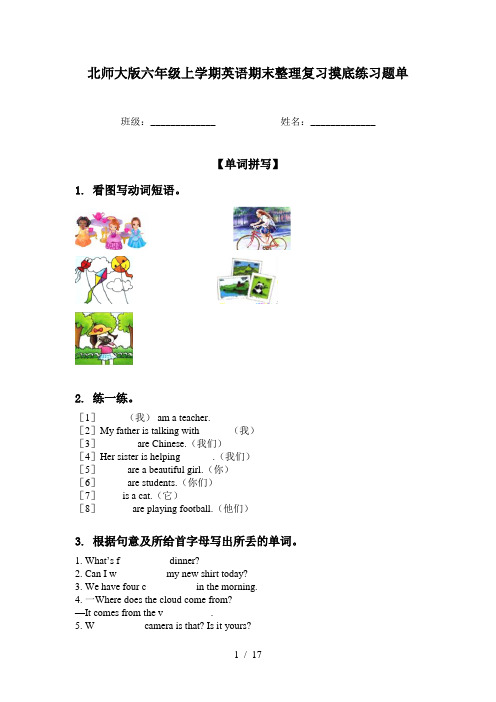
北师大版六年级上学期英语期末整理复习摸底练习题单班级:_____________ 姓名:_____________【单词拼写】1. 看图写动词短语。
________________ ______________________________ ________________________________2. 练一练。
[1]_____(我) am a teacher.[2]My father is talking with______(我)[3]_______ are Chinese.(我们)[4]Her sister is helping ______.(我们)[5]_____ are a beautiful girl.(你)[6]_____ are students.(你们)[7]____ is a cat.(它)[8]______ are playing football.(他们)3. 根据句意及所给首字母写出所丢的单词。
1. What’s f _________ dinner?2. Can I w _________ my new shirt today?3. We have four c _________ in the morning.4. 一Where does the cloud come from?—It comes from the v _________.5. W _________ camera is that? Is it yours?4. 根据词义写单词。
1.Where does the ________(雨)come from?2.I am going to the cinema ________(明天).3.I ________(有)many ________(语文)books.4.There is a ________(图书馆) in our school.5.The cat is chasing the mouse. The mouse is________(害怕的).6.We often play badminton in the________(体育馆)after c]ass.5. 根据汉语提示写出单词。
北师大六年级上学期英语期中整理复习教学知识练习
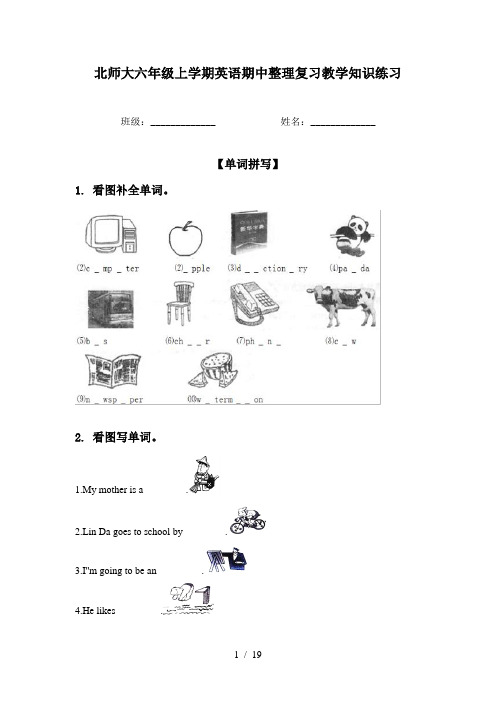
北师大六年级上学期英语期中整理复习教学知识练习班级:_____________ 姓名:_____________【单词拼写】1. 看图补全单词。
2. 看图写单词。
1.My mother is a ________.2.Lin Da goes to school by ________.3.I''m going to be an ________ .4.He likes ________ .5.She goes to work by ________ .3. 根据首字母提示写单词,补全句子或对话。
(1)We can borrow some books from the school l . (2)Do you have a c ? I want to look it up on the Internet.(3)I''m going to v my grandparents next weekend.4. 按要求写单词。
(1)slowly(形容词)________ (2)driver(动词)________(3)late(反义词)________ (4)who(所有格)________(5)she(宾格)________5. 按要求写出单词。
(1)we are (缩写)________ (2)they''re (完整形式)________(3)family (复数)________ (4)two(序数词)________(5)buy(过去式)________【填空题】6. 根据括号中所给提示,写出正确的单词。
[1]There are some cats ________ (lie) on the grass.[2]She swims very fast and she’s a good ________ (swim).[3]Would you please ________ (help) me?[4]It’s often _______ (sun) in spring here.[5]Listen ______ (much), and you’ll do ______ (well) in English listening.7. 用所给词的适当形式填空。
(完整版)北师大版六年级英语上册复习总结

Unit 1重点单词:geography(地理) science(科学) music(音乐) English(英语)history(历史) math(数学) art(美术)反义词:big(大的)- small(小的);girl(女孩)-boy(男孩);young(年轻的) -old(年老的)thin(瘦的)-fat(胖的);long(长的)-short(短的);easy(容易的)-difficult(困难的)cheap(便宜的)-expensive(昂贵的);fast(快的)-slow(慢的);cold(冷的)-hot(热的)boring(无聊的)-interesting(有趣的)重点句型:①What’s your favorite subject?(你最喜欢哪门学科?)b ecause(因为)I like art,because art is easy.(我喜欢美术,因为美术很容易。
)I don’t like math, math is boring.(我不喜欢数学,数学很无聊。
)② What teacher do you like?(你最喜欢哪位老师)I like Mr Green , He is funny.(我喜欢MrGreen,他很有趣)题型:What subject do you like?What subject do you dislike(不喜欢)?What teacher do you like?Give you reasons(理由).你喜欢哪门学科?你不喜欢哪门学科?你喜欢哪位老师,说出理由.语法知识:动词的时态变化的标志词①过去式— Yesterday(昨天);Last(上一个);ago(以前)动词用过去式,加ed 或不规则的过去式。
②现在时— Today(今天)usually(通常)用动词原形现在进行时—— now(现在)动词后+ing③将来时— tomorrow(明天);next(下一个);maybe(也许,可能)动词前面加will(将要)不规则动词过去式:go(去)-went; see(看见)-saw; eat(吃)-ate;have(有) –had;live(居住)-lived;swim(游泳)-swam;are-were;is/am-was根据实际情况填空,写几句话。
六年级英语上册知识点归纳北师大版

六年级英语上册知识点归纳北师大版一、单词1. 动词•be(是)•have(有)•do(做)•go(去)•see(看到)•play(玩)•like(喜欢)•want(想要)•eat(吃)•drink(喝)•sleep(睡觉)•read(读)•write(写)•listen(听)•speak(说)2. 名词•book(书)•pencil(铅笔)•ruler(尺子)•eraser(橡皮)•bag(书包)•desk(桌子)•chair(椅子)•school(学校)•friend(朋友)•teacher(老师)•student(学生)•parent(家长)•brother(兄弟)•sister(姐妹)•cat(猫)•dog(狗)•bird(鸟)•apple(苹果)•banana(香蕉)•orange(橙子)3. 形容词•big(大)•small(小)•short(矮)•long(长)•short(短)•happy(快乐)•sad(伤心)•funny(有趣的)•boring(无聊的)•difficult(困难的)•easy(容易的)•beautiful(美丽的)•ugly(丑陋的)•old(老的)•young(年轻的)二、句型1. be动词句型•I am a student.(我是一个学生。
)•He is my brother.(他是我的兄弟。
)•She is a teacher.(她是一名教师。
)•They are my friends.(他们是我的朋友。
)2. have句型•We have a bag.(我们有一个书包。
)•She has a book.(她有一本书。
)•He has two pencils.(他有两支铅笔。
)•They have a pet.(他们有一只宠物。
)3. 动词原形句型•I like to play basketball.(我喜欢打篮球。
)•She wants to eat an apple.(她想吃一个苹果。
北师大版六年级英语上册基础知识梳理
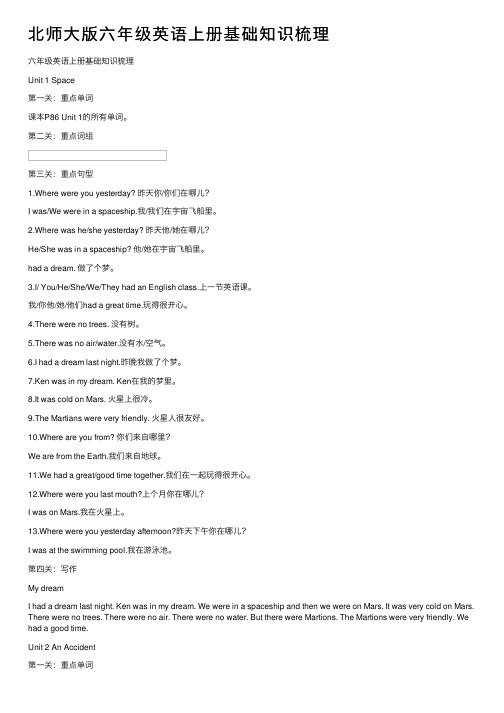
北师⼤版六年级英语上册基础知识梳理六年级英语上册基础知识梳理Unit 1 Space第⼀关:重点单词课本P86 Unit 1的所有单词。
第⼆关:重点词组第三关:重点句型1.Where were you yesterday? 昨天你/你们在哪⼉?I was/We were in a spaceship.我/我们在宇宙飞船⾥。
2.Where was he/she yesterday? 昨天他/她在哪⼉?He/She was in a spaceship? 他/她在宇宙飞船⾥。
had a dream. 做了个梦。
3.I/ You/He/She/We/They had an English class.上⼀节英语课。
我/你他/她/他们had a great time.玩得很开⼼。
4.There were no trees. 没有树。
5.There was no air/water.没有⽔/空⽓。
6.I had a dream last night.昨晚我做了个梦。
7.Ken was in my dream. Ken在我的梦⾥。
8.It was cold on Mars. ⽕星上很冷。
9.The Martians were very friendly. ⽕星⼈很友好。
10.Where are you from? 你们来⾃哪⾥?We are from the Earth.我们来⾃地球。
11.We had a great/good time together.我们在⼀起玩得很开⼼。
12.Where were you last mouth?上个⽉你在哪⼉?I was on Mars.我在⽕星上。
13.Where were you yesterday afternoon?昨天下午你在哪⼉?I was at the swimming pool.我在游泳池。
第四关:写作My dreamI had a dream last night. Ken was in my dream. We were in a spaceship and then we were on Mars. It was very cold on Mars. There were no trees. There were no air. There were no water. But there were Martions. The Martions were very friendly. We had a good time.Unit 2 An Accident第⼀关:重点单词课本P86 Unit 2的所有单词。
北师大版六年级(上)英语复习提纲

8.have a ski class上(有)滑雪课
9.work out at the gym去健身房做运动
10.goskiing去滑雪
11.do karate玩空手道
12.play football踢足球
13.play tennis打网球
三、重点句型
1.问将来会发生什么事及回答
I’m going to seea movie.
2.询问事情发生的频度及回答
问:How often + do/does +人称+ do…?
答:频度副词
e.g. How oftendoyou play football?
Once a week.
I play football once a week.
Ihardlyeverplayfootball.
6. on Sundays在星期天
7. want to do ...想要做某事
8. next day第二天
9. hardly ever很少,几乎不
10. before school上学前
11. do homework做家庭作业
12.do chores做家务
13. wash the dishes洗盘子
Unit1
一、单词(words)
1. boring乏味的,无聊的
2. classmate同班同学
3. club俱乐部
4. drawing绘画,素描,图画
5. easy简单的,容易的
6. funny有趣的,滑稽的
7. history历史,历史学
8. kid小孩
9. live住,居住
10. painting绘画,油画
北师大英语六年级(上)1-3单元复习资料

福鼎市实验小学2008—2009学年第一学期六年级英语上册Unit1—3知识点归纳Unit 1一、单词(注意was\were的使用和太空类的单词)1.space 太空2.planet 行星3.moon 月球4.star 星星5.spaceship 宇宙飞船6.astronaut 宇航员7.dream 梦想8.air 空气9.afraid 害怕10.yesterday 昨天11. is、am- was 的过去式12. are -were 的过去式13.had have 的过去式二、短语1.Had a dream 做了一个梦2.On mars 在火星上3.very cold 很冷4.be from 来自…5.in my dream 在我的梦中6.In a spaceship 在宇宙飞船里7.many planets 很多行星8.be afraid 担心9.be friendly友好的10.had fun 过得愉快11.on the train 在火车上12.at the movie theater 在电影院13.yesterday afternoon 昨天下午14.at the park 在公园里15.at home 在家16.at school 在学校17.in the kitchen 在厨房18.Monday afternoon 星期下午st night 昨天晚上20.space suit 太空服三、句型1. Are you ready?你准备好了吗? - Y es, I am 是的准备好了- No, I’m not没,还没准备好2. What are these? 这是什么?3. Who are they? 他们是谁? -They are…他们是…4. Where are you from? 你们来自哪里? We are from the earth 我们来自地球5. We were in a spaceship. 我们来自一艘宇宙飞船里(过去式)6.He was an astronaut , too. 他也是一名宇航员7.There were many stars and planets. 那里有很多星星和行星(过去时)8.There was no water 哪里没水9.I had a good dream 我做了一个好梦10.Where were you then?你那时在哪里?-I was…我在…11.We had lots of fun there 我们在那里找到很多乐趣四、课文第二页到第三页,会读、会理解,会问答.五、语法,掌握“was、were、had”的使用和“Where were you yesterday?”的问答。
小学六年级北师大上学期英语期末综合复习必考题型
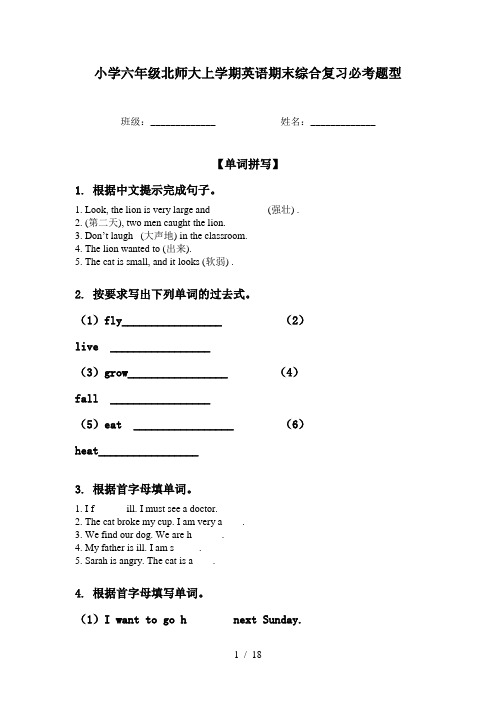
小学六年级北师大上学期英语期末综合复习必考题型班级:_____________ 姓名:_____________【单词拼写】1. 根据中文提示完成句子。
1. Look, the lion is very large and ___________(强壮) .2. (第二天), two men caught the lion.3. Don’t laugh (大声地) in the classroom.4. The lion wanted to (出来).5. The cat is small, and it looks (软弱) .2. 按要求写出下列单词的过去式。
(1)fly_________________ (2)live _________________(3)grow_________________ (4)fall _________________(5)eat _________________ (6)heat_________________3. 根据首字母填单词。
1. I f______ ill. I must see a doctor.2. The cat broke my cup. I am very a____.3. We find our dog. We are h______.4. My father is ill. I am s_____.5. Sarah is angry. The cat is a____.4. 根据首字母填写单词。
(1)I want to go h next Sunday.(2)My h is singing.(3)—Let''s go shopping.—Good i !5. 根据图片写出正确的英语单词。
1. 2._______________ _______________3 4._______________ _______________5. 6._______________ _______________【填空题】6. 用(How many/How much)的适当形式填空。
北师大版英语六年级上册复习
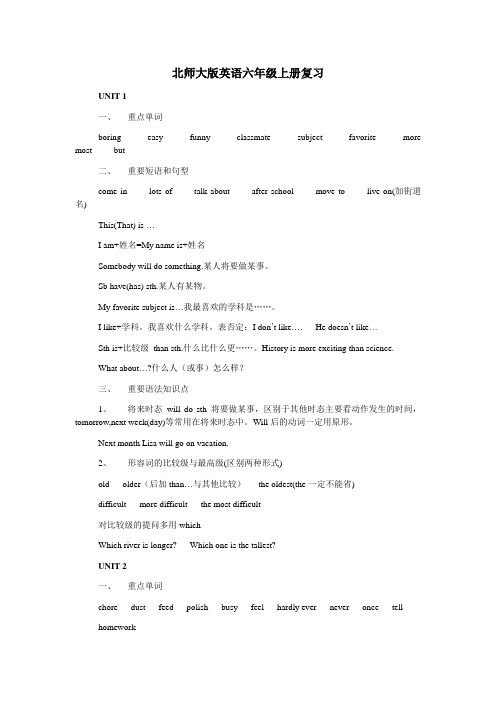
北师大版英语六年级上册复习UNIT 1一、重点单词boring easy funny classmate subject favorite more most but二、重要短语和句型come in lots of talk about after school move to live on(加街道名)This(That) is …I am+姓名=My name is+姓名Somebody will do something.某人将要做某事。
Sb have(has) sth.某人有某物。
My favorite subject is…我最喜欢的学科是……。
I like+学科。
我喜欢什么学科。
表否定:I don’t like…. He doesn’t like…Sth is+比较级than sth.什么比什么更……。
History is more exciting than science.What about…?什么人(或事)怎么样?三、重要语法知识点1、将来时态will do sth 将要做某事,区别于其他时态主要看动作发生的时间,tomorrow,next week(day)等常用在将来时态中。
Will后的动词一定用原形。
Next month Lisa will go on vacation.2、形容词的比较级与最高级(区别两种形式)old older(后加than…与其他比较)the oldest(the一定不能省)difficult more difficult the most difficult对比较级的提问多用whichWhich river is longer? Which one is the tallest?UNIT 2一、重点单词chore dust feed polish busy feel hardly ever never once tellhomework二、重要短语和句型once a week walk the dog feed the fish polish my shoes do my homework clean my room dust the furniture cut the grass make my bed take out the trash get upwant to do sth 想要做某事(to后的动词一定是原形,否定时在want前加don’t或doesn’t)have to do sth 必须做某事(用have还是has视主语人称而定)ask sb about sth 问某人关于某事feel sad(happy) 感到伤心(高兴)What do you have to do?你必须做什么?三、重要语法知识点1、一般现在时在every day,once a week,always, never,usually等表动作执行的频率的副词或短语出现在句中时,该句多为一般现在时。
北师大版六年级(上)英语复习提纲

北师大版六年级(上)英语复习提纲Unit 1一、单词(words)1. boring 乏味的,无聊的2. classmate 同班同学3. club 俱乐部4. drawing 绘画,素描,图画5. easy 简单的,容易的6. funny 有趣的,滑稽的7. history 历史,历史学8. kid 小孩9. live 住,居住10. painting 绘画,油画11. subject 学科12. esp e cially 特别地,尤其13. experiment 实验,试验14. geography 地理学15. introduce 介绍16. maybe 或许,可能17. neighbor 邻居18. neighborhood 近邻,街坊19. really 真正地,确实20. themsel ves他们(她们,它们)自己二、复习有关课程的单词1.art 艺术、美术课2.English 英语课3.science 科学4. music 音乐5. math 数学6. P. E. 体育7. Chinese 语文8. geography 地理9. history 历史10.physics 物理(不要求)11.chemistry 化学(不要求)三、短语1. favorite subject 最喜欢的学科the most difficult subject 最困难的学科the most boring subject 最无趣的学科2.talk about …谈论e.g. They are talking about their favorite subjects.3. have fun 玩得开心have fun with 做…很开心,和…玩得开心,愉快参与到…中e.g. The BINGO kids are having fun.You can have fun with your kid.You'll have a lot of fun with the creation stories.你能从读创世纪故事中获得快乐.We’ll have lots of fun together.4. want sb. to do …要某人做某事want sb. to …要某人去某地e.g. BINGO kids want Ann and Ken to join their club.Charlie’s mom want him to school on Saturday.5. older brother 哥哥younger brother 弟弟fat(fatter fattest) wet(wetter wettest) (4).以“辅音字母+y”结尾的形容词,将y变为i,加-er构成比较级,加-est构成最高级funny(funnier funniest)(5).其它双音节和多音节形容词,前面加more 构成比较级,前面加the most构成最高级interesting boring exciting difficult4.能够分清英语单词的词性名词noun n.代词pronoun pron.动词verb v.形容词adjective adj.副词adverb adv.5. 复习动词的单、复数形式和用法(1). 一般情况加-sread write work come(2). 以[s] [ʃ] [tʃ]音素结尾或以字母-o结尾的动词,加-espass(passes) push(pushes)watch(watches)do(does) go(goes) (3). 以“辅音字母+y”结尾的动词,亦y为i,再加-es Study(studies) try(tries) fly(flies) apply(applies) Unit 2一、单词1. busy 忙碌的2. chore 家务3. do chores 做家务4. dish 盘子5. dust 掸去,刷去(灰尘)6. feed 喂(养),饲(养)7. feel 感觉,感受8. grass 草9. homework 家庭作业10. once 一次,一回11. twice 两次,两回12. once ( twice) a week每周一次(两次)13. plant 植物14. polish 擦(鞋),刷(鞋)15. street 街道16. tell 告诉17. think 认为,以为18. trash 垃圾19. furniture 家具20. never 从不,决不21. person 人二、短语1. make the (my) bed 铺床2. clean the(my) room 打扫房间3. walk the dog 遛狗4. every week(day)每周(天)5. every morning 每天早晨6. on Sundays 在星期天7. want to do ... 想要做某事8. next day 第二天9. hardly ever 很少,几乎不10. before school 上学前11. do homework 做家庭作业12. do chores 做家务13. wash the dishes 洗盘子14. feed the fishes 喂鱼15. cut glass 割草16. water the plants 给植物浇水17. polish the shoes 擦鞋18. take out the trash 倒垃圾三、重点句型1.询问某人必须做某事及回答问:What (chores/works) + do/does + 代/名词+ have to do?答:代/名词+have/has to…..e.g.What chores do you have to do?I have to make my bed every day.What chores dose he have to do?He has to feed the fishes every day.2、否定句(不必)don’t / doesn’t +have toe.g. I don’t have to feed the fishes every day.He doesn’t have to water the plants every week.四、语音掌握字母y在单词结尾(辅音字母+y)的发音[i];easy dirty juicy tiny noisy sleepy五、语法1.频度副词的基本用法:副词+动词:always,usually,often,sometimes,hardly ever,never句子最后:once/twice a week/month/year,on Sundays/Mondays/。
小学六年级北师大上学期英语期中综合复习易考题
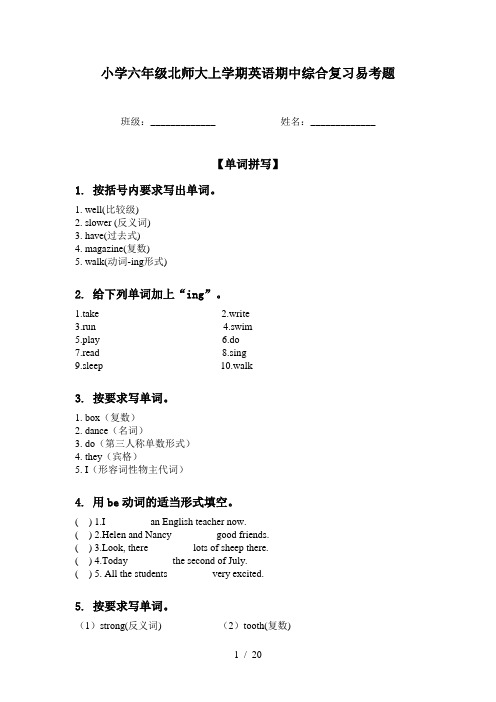
小学六年级北师大上学期英语期中综合复习易考题班级:_____________ 姓名:_____________【单词拼写】1. 按括号内要求写出单词。
1. well(比较级)________2. slower (反义词)__ ______3. have(过去式) ________4. magazine(复数)________5. walk(动词-ing形式)________2. 给下列单词加上“ing”。
1.take ________________2.write _______________3.run _________________4.swim ________________5.play ________________6.do __________________7.read ________________ 8.sing ________________9.sleep _______________ 10.walk _______________3. 按要求写单词。
1. box(复数)______________________2. dance(名词)______________________3. do(第三人称单数形式)______________________4. they(宾格)______________________5. I(形容词性物主代词)______________________4. 用be动词的适当形式填空。
( ) 1.I ________ an English teacher now.( ) 2.Helen and Nancy ________ good friends.( ) 3.Look, there ________ lots of sheep there.( ) 4.Today ________ the second of July.( ) 5. All the students ________ very excited.5. 按要求写单词。
- 1、下载文档前请自行甄别文档内容的完整性,平台不提供额外的编辑、内容补充、找答案等附加服务。
- 2、"仅部分预览"的文档,不可在线预览部分如存在完整性等问题,可反馈申请退款(可完整预览的文档不适用该条件!)。
- 3、如文档侵犯您的权益,请联系客服反馈,我们会尽快为您处理(人工客服工作时间:9:00-18:30)。
北师大版英语六年级上册复习
UNIT 1
一、重点单词
boring easy funny classmate subject favorite more most but
二、重要短语和句型
come in lots of talk about after school move to live on(加街道名) This(That) is …
I am+姓名=My name is+姓名
Somebody will do something.某人将要做某事。
Sb have(has) sth.某人有某物。
My favorite subject is…我最喜欢的学科是……。
I like+学科。
我喜欢什么学科。
表否定:I don’t like…. He doesn’t like…
Sth is+比较级than sth.什么比什么更……。
History is more exciting than science.
What about…?什么人(或事)怎么样?
三、重要语法知识点
1、将来时态will do sth 将要做某事,区别于其他时态主要看动作发生的时间,
tomorrow,next week(day)等常用在将来时态中。
Will后的动词一定用原形。
Next month Lisa will go on vacation.
2、形容词的比较级与最高级(区别两种形式)
old older(后加than…与其他比较)the oldest(the一定不能省)
difficult more difficult the most difficult
对比较级的提问多用which
Which river is longer? Which one is the tallest?
UNIT 2
一、重点单词
chore dust feed polish busy feel hardly ever never once tell
homework
二、重要短语和句型
once a week walk the dog feed the fish polish my shoes do my homework clean my room dust the furniture cut the grass make my bed take out the trash get up
want to do sth 想要做某事(to后的动词一定是原形,否定时在want前加don’t或doesn’t)have to do sth 必须做某事(用have还是has视主语人称而定)
ask sb about sth 问某人关于某事
feel sad(happy) 感到伤心(高兴)
What do you have to do?你必须做什么?
三、重要语法知识点
1、一般现在时在every day,once a week,always, never,usually等表动作执行的频率的副
词或短语出现在句中时,该句多为一般现在时。
此时谓语动词用原形,但当主语是
第三人称单数时,谓语动词要加s或es。
He gets up early every day.
2、在家和在学校介词用at。
at home at school
一、重点单词
cool find information invitation learn partner receive sometimes
sound
二、重要短语和句型
work out look at be from receive an invitation do homework
go swimming have dreams play the guitar sing songs play football
do karate go bowling
How often do you do sth?你多久做一次某事?(问频率)
have a partner for sth(doing sth) 有个做某事的搭档
at five o’clock 在五点钟
have a …class 有一节什么课
play with sb 和某人玩
What are you doing…?你将要做什么?
It sounds great! 听起来很不错!(太好了!)
三、重要语法知识点
1、be doing sth
一般情况下,表现在进行时,正在做某事。
本单元重点用于一般将来时,表最近将要做某事。
当它表将来时,一般时间状语为较近的词,如this week,tomorrow等,动词仅限于某些瞬间动词,如go,start,begin,leave等。
He is flying to Beijing tomorrow.
I’m going swimming this afternoon.
What are you doing tomorrow?
2、be going to do 和will都可以表将来。
3、注意以下单词划线字母的读音
usually television garage casual treasure [ʒ]
UNIT 4
一、重点单词
prefer buy cost latest pair people pop quick spend style
二、重要短语和句型
choose a gift a pair of in the end
I like(hate,prefer) sth(dong sth). 我喜欢(讨厌或最喜欢)某物(做某事)。
Those aren’t his style. 那些不是他的风格(或不是他喜欢的类型)。
It’s so expensive. 太贵了。
Which one? 哪一个?
do sth for sb 为某人做某事buy a birthday gift for Daniel
ask sb to do sth 请求某人去做某事Ann asks Daniel to play a video game.
三、重要语法知识点
1、问价格的提问方法
How much is sth? 某物多少钱?回答:It’s+价钱。
How much does sth cost? 某物值多少钱?回答:It costs +价钱。
2、某些名词在汉语中是单数,在英语中用复数形式,如sunglasses,gloves,sweatpants
等,具体表达方式a pair of sunglasses一副太阳镜a pair of gloves一双手套
3、注意区别使用表远近及单复数的代词this,that,these,those.
一、重点单词
accident advice angry bored check deep dizzy explain give glad medicine press problem scared screen sure switch tired understand weekend work toothache
二、重要短语和句型
turn on turn off
It’s broken. 它坏了(不工作了)。
It stop working.
be angry with sb 对(或因)某人生气
explain to sb 对某人解释
give sb advice 给某人建议
I’m really sorry. 我真的很抱歉。
注意really的使用,加重语气。
play a game on computer 在电脑上玩游戏注意介词用on
三、重要语法知识点
1、should 的使用
What should I/he/they do?我(或他、他们)应该怎么办(做什么)?
I/he/they should do sth.
Should(shouldn’t)+动词原形
2、不定冠词a,an 的基本用法,一般情况下,其后的名词以元音字母开头,前面的不
定冠词用an 。
Orange octopus umbrella egg
3、关于情绪状态的表达
I’m angry. I’m scared. I’m tired.
4、关于出了问题(Problem)和给予建议(Advice)(课本P52)
期末英语复习注意事项
1、熟练掌握本学期所学单词,听、读、写、意。
2、复习不规则动词的过去式。
3、形容词的比较级(一种加-er,-est;一种加more,the most),自己归纳总结。
4、时态的复习:一般现在时,一般过去时,一般将来时,主要是谓语动词的变
化,注意根据时间状语,频度副词进行判断和选择。
5、英语中常见反义词的整理和记忆。
6、常用动词短语的归纳总结。
7、代词的主格、宾格、所有格和名词性物主代词的使用规则。
8、熟悉最常见句型:主谓,主谓宾,主系表。
注意每个成分分别可由什么词或
短语构成,解决考试中连词成句及阅读理解的问题。
9、在主语为第三人称单数时谓语动词的变化,以及肯定句、否定句和疑问句时
谓语动词的变化。
10、主谓一致,数量和名词的单复数一致,时间与时态一致。
